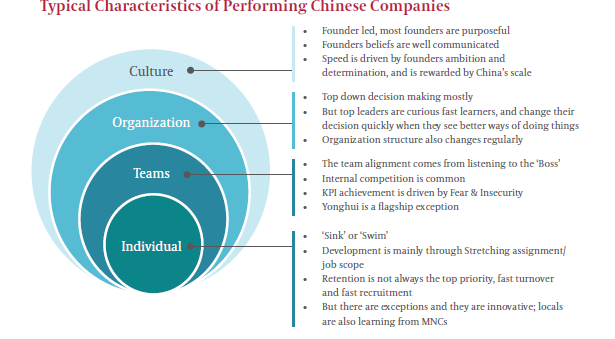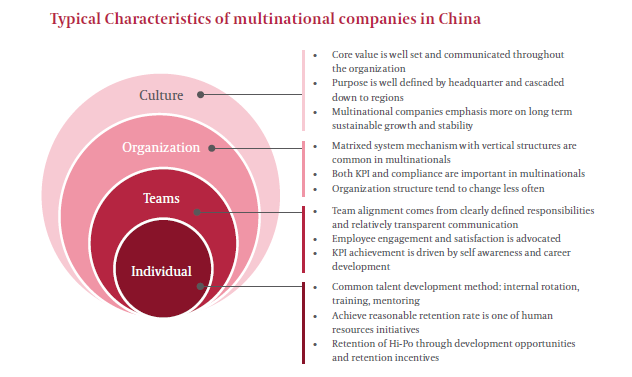Multinational companies (MNC) and founder-led companies have one important thing in common: They are competing for the same talent. However, they offer very different working environments. Founder-led companies have an entrepreneurial environment, a quicker decision-making process, and a culture that allows for mistakes. MNCs have a clearly developed strategy, defined structure and policies, and agreed-upon key performance indicators.
What’s driving founder-led companies to seek MNC talent, and how can MNC executives successfully transition to a new way of working? Egon Zehnder gathered a dozen MNC executives in Shanghai who have worked (or are working) in founder-led companies to share how they were able to adjust and flourish in a different environment.
Why Founder-Led Companies Need MNC Talent
There are several major reasons why founder-led companies are in need of global talent. Perhaps the most significant is that they need the support and talent of multinational executives to expand, as companies need different skills sets as they grow. One attendee, a COO of a global healthcare company that began as a small company in Shanghai, explained that founder-led companies need leaders who understand the western world and have the language and communications capabilities to reach across cultures and markets.
However, this infusion of talent has to come at the right time. Founder-led companies are in different stages, and each stage requires a different type of MNC experience. The four major stages are:
- Survival Stage: The founder and his or her followers lead the company. They aremostly not yet ready for MNC talent.
- Competitive Stage: At this point, the company is competing with scaled players and some are considering going public and need the help of experienced (financial) officers to make that transition or more experienced marketing leaders to help build a stronger brand. Most companies at this stage look for senior functional executives from MNCs to “fill their own capability gap.” In addition, high-profile professionals with a shining background as part of a leadership team is almost a “must” to tell the IPO story if the company is going for IPO.
- Globalization Stage: As the company becomes a global competitor, MNC talent is needed to create organizational structure for a global company. Founder-led companies are often first generation businesses, and their structures typically do notevolve symmetrically as they grow.
- Sustainability and Risk Control Stage: At this stage, companies need more sophisticated leaders with global/scaled experience to be successful, and most founders do not necessarily have extensive experiences. Companies start to appoint external COO/(Co-)CEOs in addition to functional leaders.
Corporate Culture War
Making the move to a founder-led company from an MNC comes with its share of challenges. Each type of company has a clearly defined culture with some dramatic differences. It’s the responsibility of the founder to ensure they have a culture that can embrace new talent and create a dynamic that allows for sharing ideas—both what has historically worked for the company and changes that could be made with the new talent joining the ranks.

The pace of change is one of the most difficult adjustments. MNCs diligently develop strategy first, and execution starts from the top. In a founder-led company, there is less focus on strategy and more emphasis on execution as well as trial and error. One attendee commented that a common scenario is for the CEO to set a plan in the morning and then follow up on progress on said plan that evening.
It’s also a type of culture where work is valued at the cost of almost everything else. Some event attendees noted that working hard is necessary for founder-led companies to survive the constant and numerous changes. Others said this type of unbalanced work-life structure is not sustainable for less established companies.

Despite some of the challenges, many MNC executives are drawn toward the positive sides of working in a founder-led company. They like the idea of being bigger contributors to the local economy, having more decision-making power, and the ability to grow their leadership skills by working in a company that empowers a different employee mindset. They are also often enticed by the strong team culture in founder-led companies.
Adapting to a New Way of Working
Both founder-led companies and the leaders joining from MNCs need to adapt some of their methods in order to work in harmony. Companies must ensure they are building a corporate structure that helps to better align key company objectives and incentivize employee performance in a better way. They also must identify emerging leaders with high potential early on by asking:
- Is this individual curious and intent on improving his or her skills and knowledge?
- Can this person analyze data, draw conclusions, and use it to drive behavior transformation?
- Is this person a good communicator?
- Is this individual motivated to obtain a goal in spite of obstacles?
If the employee exhibits these abilities, the company must act to develop them quickly. This development phase is essential to retain MNC leaders, as most MNCs have robust learning and development programs and employees are accustomed to having access to them.
The MNC executives must also come into founder-led companies with open minds. While they may have been brought in to help develop a more formalized structure, they must also take the time to learn how the organization evolved organically and what would help it to embrace change.
Five Must Dos When Joining a Founder-Led Company from an MNC
Event attendees shared some of their top lessons learned from transitioning between multinational and founder-led companies.
- All-in attitude. Fully devote yourself to learning the new working culture.
- Come with an open mind and leave your pride and criticism at the door. While you may know different ways of doing things, you do not know if those methods will be effective in your new environment. The least popular comments start with “In my previous company…”
- Observe before you jump in. Give yourself several months after onboarding to absorb and develop a deeper understanding of the culture and ways of working.
- Achieve three win early on. This will help you establish credibility with the CEO.
- Work on developing a transparent relationship with the CEO. Establish ongoing meetings to report on necessary details.





